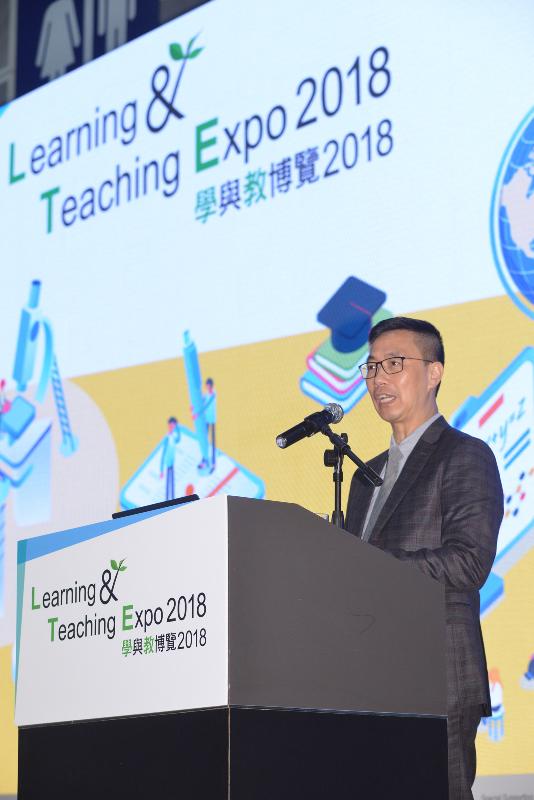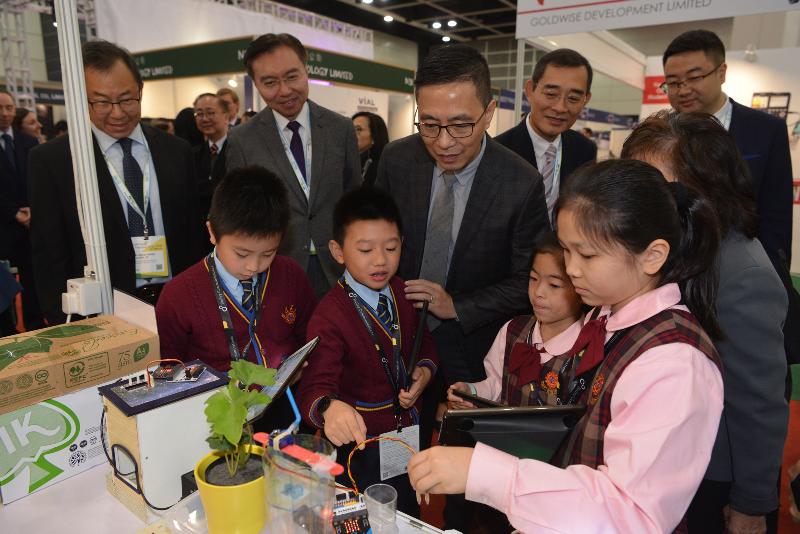Speech by SED at opening ceremony of Learning and Teaching Expo 2018 (English only) (with photos)
Following is the speech by the Secretary for Education, Mr Kevin Yeung, at the opening ceremony of the Learning and Teaching Expo 2018 today (December 12):
Mr Lee (Chairman of the Board of Directors of Hong Kong Education City, Mr Sunny Lee), distinguished guests, ladies and gentlemen,
Good morning. It is my great pleasure to join you all today at the opening ceremony of the ninth Learning and Teaching Expo. First of all, I would like to extend a very warm welcome to everyone here, especially visitors from other places.
The Learning and Teaching Expo is Asia's leading education exposition and Hong Kong's annual signature education event presented by the Hong Kong Education City. Gathering education professionals and technology practitioners, the Expo provides an excellent platform for exchanging views on the smart use of technology to enhance the quality of learning and teaching. This year, we have a record-breaking number of exhibition booths and professional development sharing sessions. They show a great variety of resources and technology, and new developments on education.
The theme this year is "Tomorrow's Learning Today". Through efforts to sustain the development of information technology (IT) in education, the Government aims to prepare students for challenges of the 21st century. Over the past two decades, we have been tapping into the power of IT to enhance the effectiveness of learning and teaching, and there has been remarkable enhancement in schools' IT environment and capacity.
Building on existing strengths and the experiences gained, the Education Bureau continues to unleash students' potential and develop their "learning to learn" capabilities through leveraging on the use of IT. We have adopted a holistic approach that encompasses different strategic actions, which include enhancing schools' IT infrastructure, promoting capacity building in schools, and renewing curriculum. By now and for the first time in Hong Kong, all 1 000 public sector schools have basically established a WiFi infrastructure on their campus. With WiFi service covering all classrooms, students can learn on their own and collaborate with one another by using mobile computing devices. This development provides a favourable environment for revolutionary changes both within and outside the classroom. What was once unlikely has or will become possible and practicable. To facilitate teachers in adjusting to the wave of change, we have been organising a variety of training programmes that seek to further enhance the professional leadership and capacity of school leaders and teachers.
Schools have been positive towards implementing e-learning. Apart from devising their own e-learning plans according to their circumstances and needs, schools also adopt various e-learning strategies to enhance effectiveness of learning and teaching. I am excited to learn of these good practices in some schools. For example, various learning management systems facilitate peer collaboration, and enable students to exchange information and ideas or work on a project together anytime and anywhere. Also, the collection of learning data and the provision of timely feedback are at our fingertips, which encourages self-directed learning of students. The technologies of virtual reality and augmented reality are now used by schools to conduct virtual field trips and experiments, and to help students acquire new knowledge in various subjects and areas, such as Chinese history, geography, STEM education and language learning. While schools have different paces in implementing e-learning, the school community has generally demonstrated a paradigm shift in transforming learning and teaching through the innovative use of IT.
In fact, competency in using IT is an important 21st century skill. We have also placed due emphasis on developing students' information literacy, with a view to enhancing their awareness of e-safety and nurturing them as effective, responsible and ethical IT users. Since the update of the framework on "Information Literacy for Hong Kong Students" in 2016, various online resources and training programmes have been made available to support teachers in developing students' information literacy and teaching students the right attitude towards using IT. I know that teachers have skilfully incorporated the element of information literacy into cross-curriculum learning activities that put students into authentic contexts. For example, the ability to locate reliable information among multiple sources and to identify facts and judgements when reading a news article is developed in library and language lessons. In addition, many schools have already agreed on a set of principles with students and their parents to ensure that students will use IT and IT tools to enhance learning in a responsible and proper way. With teachers' adequate support, students set out to explore the digital world and this exploration has become part of their learning experience and daily life.
To better equip the younger generation for a challenging future, we need to enrich the education sector with useful insights, expertise and innovation from different countries and regions. Let me take this opportunity to thank the Hong Kong Education City for making this exposition a valuable platform for educators to conceive and exchange innovative ideas on learning and teaching. I believe that what educators aspire to learn and do today will inspire the education community on tomorrow's learning. May I wish the event a great success and all of you a fruitful and inspirational experience. Thank you.

